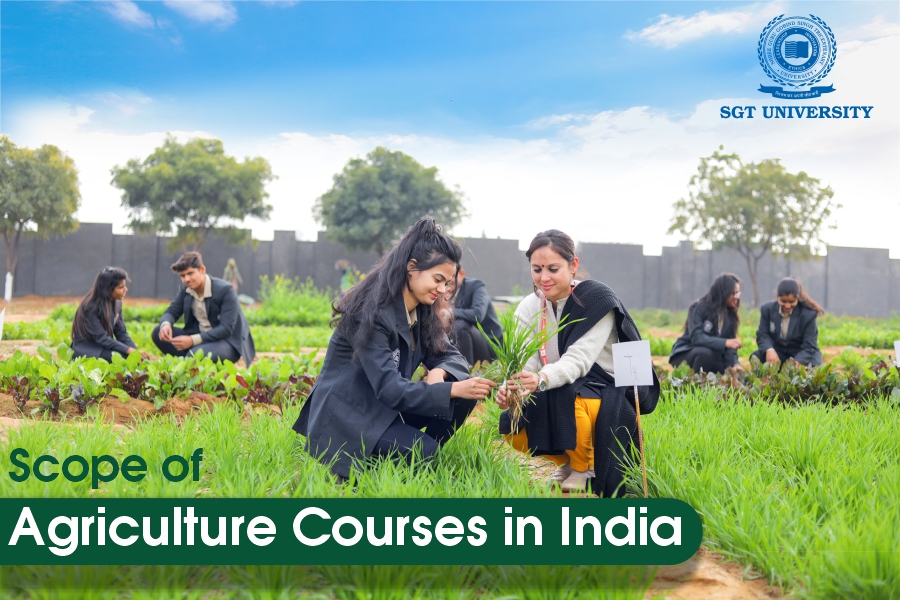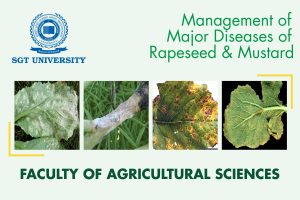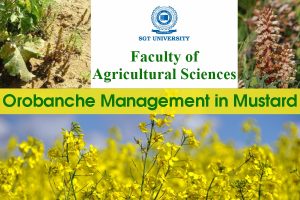Scope of Agriculture Courses in India is vast and full of many opportunities. India has a large percentage of farming land and a growing population to feed. Therefore, it becomes an urgent requirement to have the best agricultural scientists available to increase the food output without compromising on quality.
Agriculture Sciences in India is a multidisciplinary field with a broad curriculum at both the undergraduate (UG) and post-graduate (PG) level.
A degree in Agriculture science will provide the student with the following skills:
- Exposure to varied subjects like Agricultural Biotechnology, Economics, Microbiology, Horticulture, Plant Pathology
- Business skills
- Farm management
- Interpersonal skills
- Organization skills
- Research skills
- Scientific and Technical skills
- Time Management skills
Career Prospects and Job Scope of Agriculture in India
There will never be a shortage of requirement for skilled agriculture scientist in India. Agriculture scientist jobs are available both in private sector and government sector. Dedicated think-tanks and important agricultural planning organizations like ICFA (Indian Chamber of Food and Agriculture) are always on the lookout for top talent.
Career prospects and job scope in agriculture In India are:
- Agriculture and Horticulture Development Officer
- Entrepreneur in Agribusiness of seeds, fertilizer, pesticide, etc.
- Farm Manager
- Food Microbiologist
- Food Scientist & Researcher in Public & Private Organizations
- Plant geneticist
- Rural Agriculture Development Officer in Public & Private Banks
- Soil Analyst
- Soil Conservation Officer
- Teacher and Researcher in Private & Public Universities
- Technical Assistant or Technical Officers in Agricultural Universities like ICAR & DRDO
Best Agriculture University in Delhi NCR
Shree Guru Gobind Singh Tricentenary University (SGTU) Gurugram, founded in 2013 under the Haryana Private Universities (Amendment) Act is one of the best Agriculture universities in Delhi NCR and Haryana.
Agriculture courses at undergraduate and postgraduate level are taught by the Faculty of Agricultural Sciences (FASC) at SGT University. The courses are developed under the modern guidelines of CAR Fifth Deans Committee recommendations. FASC is equipped with state-of-the-art facilities to help students with Research and Practical work.
SGT University houses specialized laboratories like Tissue Culture Lab, Post Harvest Lab, and Soil Testing Lab. It also has links with leading agricultural science research institutes like ICAR, The University of Queensland and National Seed Corporation (NSC).
Agriculture Courses and Eligibility
At SGT University the following courses are offered in Agriculture Sciences:
Under Graduate
Post Graduate
- Master of Science in Agriculture [Agronomy/Plant Pathology/Horticulture (Fruit Science & Vegetable Science)/Entomology/Agriculture Extension/Soil Science]
Doctorate
- Ph.D in Agricultural Sciences [Hort. Fruit Science/Hort. Vegetable Science/Genetics and plant breeding/Soil science/Agronomy]
Agriculture Courses Syllabus
- Bachelor of Science (Hons.) (Agriculture) – It is an 8 semester course consisting of both theory and practical.
- Master of Science in Agriculture – It is a 4 semester course. It offers specialization in the following fields:
- M.Sc. Ag. (Agronomy)
- M.Sc. Ag. Horticulture (Fruit Science)
- M.Sc. Ag. Horticulture (Vegetable Science)
- M.Sc. Ag. (Plant Pathology)
- M.Sc. Ag. (Entomology)
- Doctor of Philosophy – It is a 3 years course. It provides specialization in the following fields of agriculture:
- Ph.D. Agronomy
- Ph.D. Soil science
- Ph.D. Horticulture
- Ph.D. Genetics & Plant Breeding
The complete syllabus for all the courses is available on the website.
Agriculture Courses Fee Structure
- Bachelor of Science (Hons.) (Agriculture) – The fee structure of Bachelor of Science in Agriculture at SGT is INR 87,500 for the first semester. From second semester onwards it is INR 75,000.
- Master of Science in Agriculture – The fee structure of Masters of Science in Agriculture at SGT is INR 87,500 for the first semester. From second semester onwards it is INR 75,000.
- Doctor of Philosophy – The fee structure of PhD in Agriculture at SGT in first year is INR 1, 52,500. From second year onwards it is INR 1, 50,000.
Agriculture Courses Admission
- B.Sc Hons. in Agriculture – The annual intake for this course is 60 students. The admission criteria is that a student must have cleared 10+2 with at least 45% marks in Physics, Chemistry, and Biology/Mathematics taken together or separately.
- M.Sc in Agriculture – The annual intake for this course is 40 students. The admission criterion is that a candidate must have B. Sc. (Agriculture)/B.Sc. (Agriculture)/B.Sc. (Hons.) Agriculture or B.Sc. (Hons.) Horticulture with minimum 55% marks.
- Ph. D in Agriculture –The admission criterion is that a candidate must have a PG in Agricultural Sciences with at least 55% marks.
Best Books & Study Materials for Agriculture
Some of the best books referred in Agricultural courses are mentioned below:
- The Botany of Desire: A Plant’s-Eye View of the World (Paperback) by Michael Pollan
- The Art and Science of Shepherding by Michel Meuret and Fred Provenza
- General Agriculture for ICAR by Jain Brothers
- Fundamentals of Soil Science by Indian Society of Soil Science
- Agricultural Economics by Reddy and Raghuram, Oxford and IBH
- Feeding the Ten Billion, Plants and Population Growth by L. T Evans
- Happy Families, Healthy Landscapes, Profitable Farms by David Pratt
Conclusion
A course in Agriculture sciences is a wonderful opportunity for students to follow their passion and learn about food production, microbiology, horticulture, farming, waste-management and animal husbandry.
It is an essential science course that is important for a nation like India if it wishes to improve its farm production efficiency. A nation’s productivity and health are dependent on the quality of nutrition it provides for its citizens. A good Agriculture course enables the students to satisfy this requirement.
SGT University is amongst the best University in Delhi for Agriculture.



